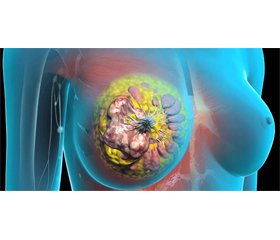Журнал «Практическая онкология» Том 6, №1, 2023
Вернуться к номеру
РІ3К-шлях клітинної регуляції при раку молочної залози: патофізіологія та значення в лікуванні
Авторы: Ковбасюк А.О., Лобанова О.Є., Зотов О.С.
Національний медичний університет імені О.О. Богомольця, м. Київ, Україна
Рубрики: Онкология
Разделы: Справочник специалиста
Версия для печати
У статті розглянуто доцільність використання алпелісибу при HR+/HER2– раку молочної залози за наявності мутації РІ3КСА на основі даних, наведених у дослідженнях BOLERO-3, SAFIR-2 та SOLAR-1. За результатами проведених клінічних досліджень було виявлено, що додавання до ендокринної терапії алпелісибу при HR+/HER2– РМЗ поліпшує виживаність без прогресування в 1,32 раза, на відміну від монотерапії гормональними препаратами та використання хіміотерапії, та не має сильних токсичних ефектів, які потребують відміни препарату. Окремо увагу слід звертати на пацієнтів із цукровим діабетом, оскільки особлива токсична дія алпелісибу проявляється у підвищенні рівня цукру в крові.
The article considers the feasibility of using alpelisib in HR-positive/HER2-negative breast cancer with РІ3KСА mutation based on data presented in the BOLERO-3, SAFIR-2 and SOLAR-1 studies. Clinical studies have shown that the addition of alpelisib to endocrine therapy in HR-positive/HER2-negative breast cancer improves progression-free survival by 1.32 times, in contrast to hormonal monotherapy and chemotherapy, and does not have severe toxic effects that require discontinuation. Particular attention should be paid to patients with diabetes mellitus, as the special toxic effect of alpelisib is manifested itself in an increase in blood sugar.
рак молочної залози; інгібітор фосфатидил-інозитол-3-кінази; протипухлинна ендокринна терапія
breast cancer; phosphatidylinositol 3-kinase inhibitor; anticancer endocrine therapy
Для ознакомления с полным содержанием статьи необходимо оформить подписку на журнал.
- Osaki M., Oshimura M., Ito H. The PI3K-Akt pathway: Its functions and alterations in human cancer. Apoptosis. 2004. 9(6). 667-676.
- Manning B.D., Cantley L.C. AKT/PKB Signaling: Navigating Downstream. Cell. 2007. 129(7). 1261-1274.
- Georgescu M.M. PTEN Tumor Suppressor Network in –PI3K-Akt Pathway Control. Genes & Cancer. December 2010. 1(12). 1170-7.
- Wang X., Trotman L.C., Koppie T., Alimonti A., Chen Z., Gao Z., et al. NEDD4-1 is a proto-oncogenic ubiquitin ligase for PTEN. Cell. January 2007. 128(1). 129-39.
- Carracedo A., Pandolfi P.P. The PTEN-PI3K pathway: of feedbacks and cross-talks. Oncogene. 2008. 27(41). 5527-5541.
- Miller T.W., Rexer B.N., Garrett J.T., Arteaga C.L. Mutations in the phosphatidylinositol 3-kinase pathway: role in tumor progression and therapeutic implications in breast cancer. Breast Cancer Res. 2011. 13(6). 224. doi: 10.1186/bcr3039.
- Pérez-Tenorio G., Alkhori L., Olsson B., et al. PIK3CA mutations and PTEN loss correlate with similar prognostic factors and are not mutually exclusive in breast cancer. Clin. Cancer Res. 2007. 13(12). 3577-3584. doi: 10.1158/1078-0432.CCR-06-1609.
- Crowder R.J., Phommaly C., Tao Y., et al. PIK3CA and PIK3CB inhibition produce synthetic lethality when combined with estrogen deprivation in estrogen receptor-positive breast cancer. Cancer Res. 2009. 69(9). 3955-3962. doi: 10.1158/0008-5472.CAN-08-4450.
- Jaiswal B.S., Janakiraman V., Kljavin N.M., et al. Somatic mutations in p85alpha promote tumorigenesis through class IA PI3K activation. Cancer Cell. 2009. 16(6). 463-474. doi: 10.1016/j.ccr.2009.10.016.
- Stemke-Hale K., Gonzalez-Angulo A.M., Lluch A., et al. An integrative genomic and proteomic analysis of PIK3CA, PTEN, and AKT mutations in breast cancer. Cancer Res. 2008. 68(15). 6084-6091. doi: 10.1158/0008-5472.CAN-07-6854.
- Saal L.H., Johansson P., Holm K., et al. Poor prognosis in carcinoma is associated with a gene expression signature of aberrant PTEN tumor suppressor pathway activity. Proc. Natl. Acad. Sci. USA. 2007. 104(18). 7564-7569. doi: 10.1073/pnas.0702507104.
- Shoman N., Klassen S., McFadden A., Bickis M.G., Torlakovic E., Chibbar R. Reduced PTEN expression predicts relapse in patients with breast carcinoma treated by tamoxifen. Mod. Pathol. 2005. 18(2). 250-259. doi: 10.1038/modpathol.3800296.
- Gewinner C., Wang Z.C., Richardson A., et al. Evidence that inositol polyphosphate 4-phosphatase type II is a tumor suppressor that inhibits PI3K signaling. Cancer Cell. 2009. 16(2). 115-125. doi: 10.1016/j.ccr.2009.06.006.
- Fedele C.G., Ooms L.M., Ho M., et al. Inositol polyphosphate 4-phosphatase II regulates PI3K/Akt signaling and is lost in human basal-like breast cancers. Proc. Natl. Acad. Sci. USA. 2010. 107(51). 22231-22236. doi: 10.1073/pnas.1015245107.
- Osborne C.K., Schiff R. Mechanisms of endocrine resistance in breast cancer. Annu Rev. Med. 2011. 62. 233-247. doi: 10.1146/annurev-med-070909-182917.
- Schettini F., Buono G., Trivedi M., et al. PI3K/mTOR inhibitors in the treatment of luminal breast cancer. why, when and to whom? Breast Care. 2017. 12. 290-294. doi: 10.1159/000481657.
- Fritsch C., Huang A., Chatenay-Rivauday C., Schnell C., Reddy A., Liu M., et al. Mol. Cancer Ther. 2014 May. 13(5). –1117-29.
- Mosele F., Stefanovska B., Lusque A., et al. Outcome and molecular landscape of patients with PIK3CA-mutated metastatic breast cancer. Annals of Oncology; Published online 24 January 2020. https://doi.org/10.1016/j.annonc.2019.11.006.
- EPIK-B3; ClinicalTrials.gov: NCT04251533.
- Rugo H.S., Mayer I., Conte P., et al. Abstract CT142: prevalence of PIK3CA mutations in patients with hormone receptor-positive, human epidermal growth factor-2-negative advanced breast cancer from the SOLAR-1 trial. Cancer Res. 2019. 79(13Suppl). CT142.
- Juric D., Andre F., Singer C.F., et al. Abstract P4-10-04: clinical outcomes of alpelisib in hormone receptor-positive, human epidermal growth factor receptor-2-negative advanced breast cancer by next-generation sequencing-detected PIK3CA alteration status and phosphatase and tensin homolog loss: biomarker analysis from the SOLAR-1 study. Cancer Res. 2020. 80(4Suppl). P4-10-04.
- Juric D., Rodon J., Tabernero J., et al. Phosphatidylinositol 3-kinase α-selective inhibition with alpelisib (BYL719) in PIK3CA-altered solid tumors: results from the First-in-Human Study. J. Clin. Oncol. 2009. 69(9). 1291-1299. doi: 10.1200/JCO.2017.72.7107.
- Juric D., Rodon J., Tabernero J., et al. Phosphatidylinositol 3-kinase α-selective inhibition with alpelisib (BYL719) in PIK3CA-altered solid tumors: results from the First-in-Human Study. J. Clin. Oncol. 2009. 69(9). 1291-1299. doi: 10.1200/JCO.2017.72.7107.
- Berns K., Horlings H.M., Hennessy B.T., et al. A functional genetic approach identifies the PI3K pathway as a major determinant of trastuzumab resistance in breast cancer. Cancer Cell. 2007. 12(4). 395-402. doi: 10.1016/j.ccr.2007.08.030.
- Kataoka Y., Mukohara T., Shimada H., Saijo N., Hirai M., Minami H. Association between gain-of-function mutations in PIK3CA and resistance to HER2-targeted agents in HER2-amplified breast cancer cell lines. Ann. Oncol. 2010. 21(2). 255-262. doi: 10.1093/annonc/mdp304.

